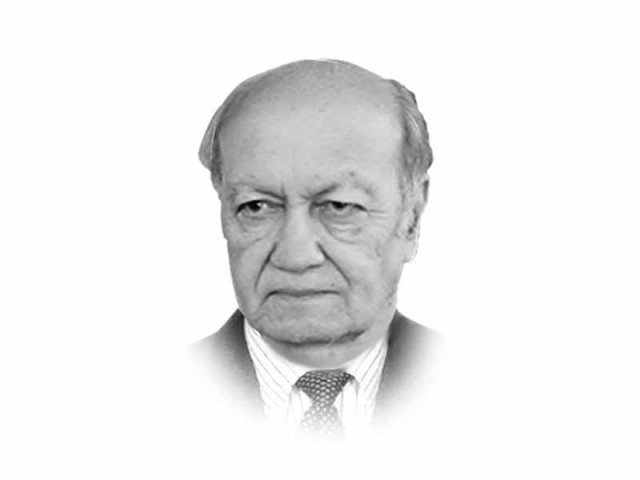Could the Wagah tragedy have been averted?
The government has to transcend from the reactive to a proactive frame of mind in order to win this existential battle


It is now an open secret that on October 31, the ISI had sent a dispatch to the home secretary, the inspector-general of police and the DG Rangers that according to reliable multiple sources, the TTP was planning a suicide attack at the Wagah parade ground. We are told that a red alert was also in place. Despite this unambiguous warning, the security agencies failed to prevent the bomber from striking. All praise to the intelligence personnel, who so precisely predicted the event, but it was to no avail, as more than 60 people lost their lives and over 100 were injured, some critically.
On October 10, 2009, there was a terrorist attack on the GHQ, in which six soldiers, including two senior officers, were martyred. Apparently, months before, the CID Punjab had alerted the GHQ authorities to the impending plan that was being hatched. Yet, it went unheeded and apart from loss of precious lives, Pakistan and its military’s image suffered a serious setback. Again, the intelligence and the CID Punjab have to be given credit for so accurately predicting and warning the GHQ well in advance.
It shows that despite many odds, our officers and their staff who collect, collate and disseminate intelligence are performing their tasks admirably well. But still, terrorists are able to strike at will and murder and maim innocent people because there is no follow-up action due to poor governance and warped priorities of the top government functionaries. After receipt of the red alert warning regarding the impending attack on Wagah, the chief minister Punjab or the home minister should have called a meeting of relevant organisational heads and told them to take extra preventive measures. No such meeting was held or any special instructions issued. Similarly, the warning on the GHQ attack was taken lightly in an unprofessional manner. Those responsible for not reacting on such solid evidence should have been held accountable. Taking cover on the flimsy excuse that such warnings are a routine does not stand to scrutiny. Anyone who has even the most rudimentary understanding of security matters knows that intelligence reports keep trickling and it is the responsibility of the higher organisation, where all these reports stream in, to build and assess the holistic picture and then take necessary action.
Another major failure of the government has been the inordinate delay in activation of the National Counter Terrorism Authority (Nacta). This has seriously undermined the government’s ability to combat terrorism and take remedial measures against the blowback from the military operations in North Waziristan, Khyber and other agencies. For this omission, all involved agencies have to take the blame. It is most unfortunate that it is the turf war between our premier civil and military institutions that has delayed Nacta from being operationalised. The prime minister’s decision to have Nacta organisationally placed under him is correct. Probably, the erstwhile military hierarchy preferred Nacta to be under the ministry of interior so that they could have a greater say in policy formulation and implementation. Moreover, ever since Nacta’s inception, the organisation had been treated with such contempt that it has become the parking place for relatives and favourites of politicians. Nacta has to be cleaned up and manned by professionals if the government is sincere about tackling the menace of terrorism. It is, however, good news that a seasoned bureaucrat has been posted to revive the organisation.
How long can this turf war or narrow institutional interests determine Pakistan’s destiny? Already, Pakistan has paid a heavy price in terms of blood and treasure. More than 50,000 civilians have fallen victim to terrorism and over 7,000 soldiers have been martyred. Incompetence of federal and provincial governments, coupled with the civil-military imbalance and mutual distrust, has weakened the ability of the state to mobilise its full potential against militancy, or for that matter, against all national challenges — economy, health and education.
State institutions cannot remain islands to themselves. The current internal and external threats demand pooling of resources, quick responses, cross-fertilisation of ideas and perspectives from different institutions to formulate effective policies and act in unison. And this is only possible provided institutions like the Committee on National Security and Nacta are fully utilised.
Leaders of political parties, too, bear a special responsibility in strengthening the state’s capacity to counter terrorism and extremism. With the exception of one or two parties, there is general indifference and lack of commitment in this regard. Madrassas continue to defy reform and government oversight. Clerics spout hatred among sects and against minorities, and go unchecked. The current state of insecurity has taken a heavy toll on the economy and has kept away both local and foreign investors. Political parties that have militant wings are not even prepared to shed them, knowing full well that this negates the very spirit of democracy and good governance. Merely passing resolutions in Parliament condemning terrorist attacks is not enough. Ironically, militant outfits are doing better coordination to augment their power than the government institutions. The government has to transcend from the reactive to a proactive frame of mind in order to win this existential battle. Gains in the military operation can only be sustained if accompanied by comprehensive administrative, economic, political and social measures. And there is scant progress in this direction.
Published in The Express Tribune, November 12th, 2014.
Like Opinion & Editorial on Facebook, follow @ETOpEd on Twitter to receive all updates on all our daily pieces.













COMMENTS
Comments are moderated and generally will be posted if they are on-topic and not abusive.
For more information, please see our Comments FAQ